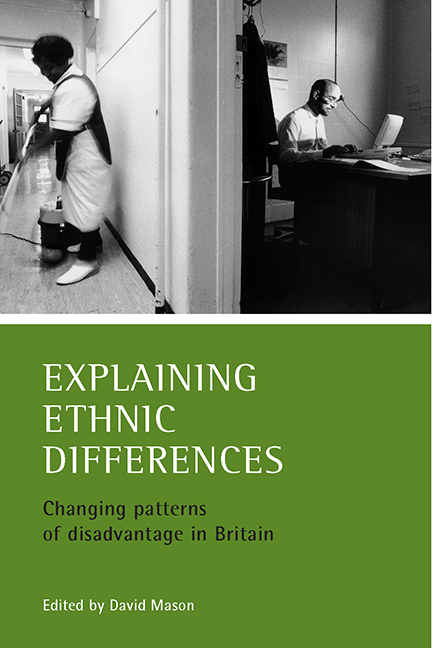Book contents
- Frontmatter
- Contents
- List of figures and tables
- Foreword
- Notes on contributors
- one Introduction
- two Changing ethnic disadvantage: an overview
- three The demographic characteristics of people from minority ethnic groups in Britain
- four Ethnic differentials in educational performance
- five Changing patterns of ethnic disadvantage in employment
- six Patterns of and explanations for ethnic inequalities in health
- seven Housing black and minority ethnic communities: diversity and constraint
- eight ‘All the women are white, all the blacks are men – but some of us are brave’: mapping the consequences of invisibility for black and minority ethnic women in Britain
- nine Police lore and community disorder: diversity in the criminal justice system
- References
- Index
six - Patterns of and explanations for ethnic inequalities in health
Published online by Cambridge University Press: 20 January 2022
- Frontmatter
- Contents
- List of figures and tables
- Foreword
- Notes on contributors
- one Introduction
- two Changing ethnic disadvantage: an overview
- three The demographic characteristics of people from minority ethnic groups in Britain
- four Ethnic differentials in educational performance
- five Changing patterns of ethnic disadvantage in employment
- six Patterns of and explanations for ethnic inequalities in health
- seven Housing black and minority ethnic communities: diversity and constraint
- eight ‘All the women are white, all the blacks are men – but some of us are brave’: mapping the consequences of invisibility for black and minority ethnic women in Britain
- nine Police lore and community disorder: diversity in the criminal justice system
- References
- Index
Summary
Introduction
Since the early 1970s, ethnic differences in health have become an increasing focus of research in Britain. During this time, there have been extensive analyses of mortality data, using country of birth as a surrogate for ethnicity (for example, Marmot et al, 1984; Balarajan and Bulusu, 1990; Harding and Maxwell, 1997). There has also been a growing number of regional (for example, Pilgrim et al, 1993) and national surveys of ethnic differences in morbidity (for example, Rudat, 1994; Nazroo, 1997, 2001a; Johnson et al, 2000; Erens et al, 2001). This growing body of research reflects, at least in part, public policy concern with the health of, and quality of healthcare provided for, minority ethnic groups.
In theory, research should lead to policy developments that improve each of these aspects, but in practice this may not be the case. This is not only because research can be poorly disseminated, or because it may provide unpalatable messages to those concerned with public finance, but also because the research itself may contribute to the racialisation of health issues. The health disadvantage of minority ethnic groups is identified as somehow inherent to their ethnicity, a consequence of their cultural and genetic ‘weaknesses’, rather than a result of the disadvantages that they face as a result of the ways in which their ethnicity or ‘race’ is perceived by others.
Indeed, despite the extensive data-collection efforts and analyses cited earlier, the factors underlying ethnic differences in mortality and morbidity remain contested, and there continues to be debate around how far differences might be attributable to the disadvantaged social circumstances in which minority ethnic people are more likely to live. For example, as long ago as 1845, Engels attributed the poor health of Irish people living in England to the poor social circumstances in which the majority of the Irish population lived (Engels, 1987). On the other hand, some claim that socioeconomic inequalities make a minimal contribution – or else none at all – to ethnic inequalities in health (Wild and McKeigue, 1997). Others suggest that, even if they do contribute, the cultural and genetic elements of ethnicity must also play a role (Smaje, 1996).
Given the growing sophistication of this field, it is worrying that crude explanations based on cultural stereotypes and claims of genetic difference persist (see, for example, Soni Raleigh and Balarajan, 1992; Gupta et al, 1995; Stewart et al, 1999).
- Type
- Chapter
- Information
- Explaining Ethnic DifferencesChanging Patterns of Disadvantage in Britain, pp. 87 - 104Publisher: Bristol University PressPrint publication year: 2003

